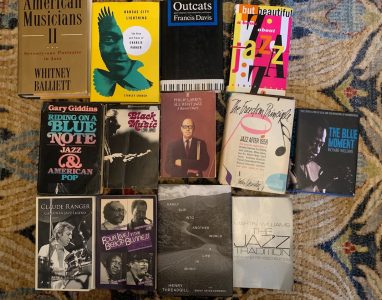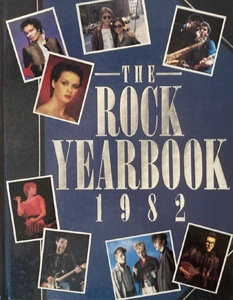By Tim Powis
Category: Book (P)reviews
Music Bookshelf: The Rock Yearbook, 1981/82/83
On Paul Gorman’s ‘Totally Wired: The Rise and Fall of the Music Press’ (review by Vic Perry)
Totally Wired: The Rise and Fall of the Music Press
Paul Gorman
Thames & Hudson, 2022, 384 pages
Benchmark pop years
In the same way that February, 1959, would have such a lasting effect on McLean, the winter of 1972 forever shaped the course of my own life. Nothing so newsworthy as a high-profile plane crash, but a benchmark nonetheless: a doorway, ground zero, my own version of Rosebud. Continue reading “Benchmark pop years”
“American Pie” and 1972 (zoomcast)
A Consumer Guide to the Plastic People of the Universe
On “the unruly curiosity of the UK music press” (new book edited by Mark Sinker)
Recently finished reading A Hidden Landscape Once a Week: The Unruly Curiosity of the UK Music Press in the 1960s-80s, which Wire magazine has helpfully reprinted excerpts from. Continue reading “On “the unruly curiosity of the UK music press” (new book edited by Mark Sinker)”
Appetite for Definition
Appetite for Definition: An A-Z Guide to Rock Genres
Ian King
HarperCollins Continue reading “Appetite for Definition”
Rock Critic Laws
In his new book, Rock Critic Law: 101 Unbreakable Rules for Writing Badly About Music, Michael Azerrad takes on the clichés that pervade rock writing. His mode is tongue-in-cheek, with the book written as a sort of satirical ‘Strunk & White’ manual for album reviewers, to be followed at the writer’s peril. If you’ve written about music, you’ll find yourself nodding along in recognition at many of the words and phrases he includes: universally loathed, criminally underrated, twin lead guitars, stunning debut.
Major Dudes: A Steely Dan Companion
Major Dudes: A Steely Dan Companion
Edited by Barney Hoskyns
The Overlook Press, 2018.
Reviewed by Vic Perry
“You can always look in the Steely Dan Listener’s Companion,” says Donald Fagen, helpfully answering a question about a lyric in an expansive 1977 interview with Sylvie Simmons originally published in Sounds, a British music paper. Continue reading “Major Dudes: A Steely Dan Companion”
18 New Music Books to Read This Summer
Via Pitchfork .
In a more perfect world where I could actually find time to read several books in one year (or, more precisely, to read several books without almost immediately falling asleep on the couch), there are maybe a handful of titles here that compel investigation (Albertine, Astral Weeks, and MIDI, especially).
Why the Beach Boys Matter (Tom Smucker)
Release date, Oct. 2, and breathlessly awaited by some (i.e., me). Table of contents is here, and is fetching (“Harmony and Discord,” “Innocence and the Second-Best Pop Album Ever,” “Summer’s Gone, the Endless Summer”). Continue reading “Why the Beach Boys Matter (Tom Smucker)”
“Wenners and Losers”
Jessica Hopper reviews Joe Hagan’s Jann Wenner bio in Bookforum:
“Sticky Fingers opens with the sort of scene that becomes its defining feature: Jann Wenner sells someone out, transacting on a relationship for whatever gain could be exacted. We meet Wenner as he is poisoning his friendship with no less than John Lennon, betraying Lennon’s trust for a $40,000 book advance. This is grimglorious rock gossip, but who really wants to read about the exploits of a vain, power-mad scoundrel running/ruining a great thing while we are living that very sitch in 2017’s Technicolor real time?”
Under My Thumb
“Discussions and analyses of music—whether on TV, in books or in the music press—have always been full of the stories of men. When female fans appear in these stories it is often through the eyes and from the perspectives of men – as muses, groupies or fangirls—meaning that women’s own experiences, ideas and arguments about the music they love are marginalized or glossed over. Women in music are frequently fetishised and objectified both in song lyrics and in real life, viewed purely in relation to men and through their impact on the male ego. But this hasn’t stopped generations of women from loving, being moved by and critically appreciating music—however that music may feel about them…”
Edited by Rhian E. Jones and Eli Davies, Under My Thumb: Songs That Hate Women and The Women Who Love Them is available now. See some early reader reviews at Goodreads.

Review: Lou Reed bio by Anthony DeCurtis
“While [DeCurtis is] skillful at assembling the biographical building blocks that reward interest at a casual level, his book isn’t just short on dirt. It’s short on resonance, advocacy, identification, deep-dive cultural spelunking, provocative arguments, nuance, fervor, and everything else that sums up the difference between perspective and an actual point of view, particularly when the subject is an artist as gnarly and passion-provoking as Lou Reed.”
–Tom Carson reviews Anthony DeCurtis’s Lou Reed: A Life. (With additional compelling thoughts about Bangs, Laurie Anderson, Robert Quine, et al.)














